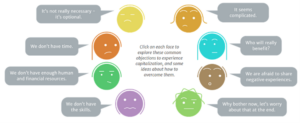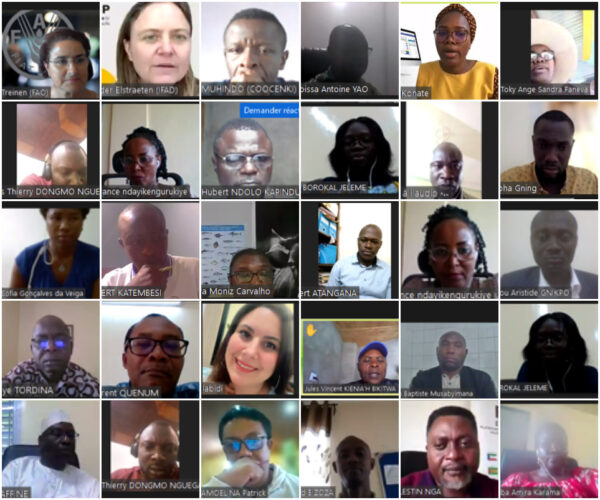On Tuesday, 27 June, we finalized the series of webinars on experience capitalization, organized since the end of March in the framework of the regional initiative YenKasa Africa, in collaboration with the Food and Agriculture Organization of the United Nations (FAO) and the International Fund for Agricultural Development (IFAD), with its OPenACP-FO4AC Programme.
This webinar has drawn conclusions and made the latest recommendations in terms of experience capitalization. Webinar 6: Recap – Conclusions et recommendations.
In addition to this sharing and the usual question-and-answer session, several YenKasa Africa partners volunteered to share their capitalization experiences. The Togolese Coordination of Peasant Organizations (CTOP TOGO) shared their expertise on SOS inputs and their work with rural radios. Experiences of CTOP and Agricultural Producers on capitalisation: SOS fertilisers
Farm Radio International (FRI) presented their platform Uliza: Innovate on radio and mobile applications – Innovating radio and mobile applications – Farm Radio International.

In conclusion, it is essential to remember that a participative learning-by-doing process, such as experience capitalization, not only gathers knowledge from a large number of participants but also develops the skills and capabilities of these people. The integration of learning from experience, therefore, has a significant impact on the capabilities of an organization.
- The strategy of small steps: starting small
- Incorporate capitalisation into the formulation of your activities.
- Capitalization is not optional; it is necessary for all your activities.
- To give yourself time to capitalise, you must integrate it at specific points in your activities and ensure that human and financial resources are included in the planning stage.
- You all have the skills to capitalize and are probably already doing so without realising it. However, you will benefit from doing it systematically. It’s not rocket science.
- Capitalization will benefit your organisation and all those involved. Once shared, the learning from your results will also enrich other organisations ready to adopt, adapt or scale up.
- We learn a lot from our mistakes, especially when we learn lessons that will constructively transform them.
Capitalizing only at the end of an initiative is risky because the knowledge and the people who possess it may no longer be there to contribute, the financial resources will no doubt be exhausted, and there won’t be enough time.
Since the end of March, the YenKasa Africa regional initiative has been organizing a series of webinars on capitalizing on experience. The Food and Agriculture Organization of the United Nations (FAO), the International Fund for Agricultural Development (IFAD), and the OPenACP-FO4ACP Programme have co-facilitated the webinars in this six-part series.
Experience capitalization is a systematic, iterative, and participative process that consists of analysing and documenting experiences to generate knowledge that can be shared and used to bring about change. It is an essential methodology for organizations to learn from experience and improve future performance. The capitalization of expertise can be applied to different sectors of activity in different contexts, including agriculture, fisheries, forestry, health, education and many others.
Summary of the six webinars
- The 1st of six webinars presents the units of the online course. It emphasizes the importance of involving all stakeholders in the capitalization process to ensure that many viewpoints and different experiences are considered.
- The 2nd webinar, devoted to preparing the experience capitalization process, comprises two stages: scoping and planning.
- The 3rd webinar focused on collecting, organizing and analysing data and information.
- The 4th webinar dealt with documentation and sharing.
- The 5th webinar looked at the value of any capitalization process
- The 6th webinar concludes the series with examples of partners and questions and answers on how to capitalize effectively.
You can watch these webinars on YenKasa Africa’s YouTube channel. For the webinars in English, please use the playlist called Experience Capitalization.
The full version of the webinars in French is available on the Facebook page of YenKasa Africa.
Through this series of webinars, YenKasa Africa, the communication initiative for family farming and rural development in Africa, is building the capacity of its members to share their knowledge and experience better. The webinars complement and do not replace the online “Capitalizing on experience for continuous learning” course available on the FAO Digital Academy website. The online course is available in four languages: English, French, Spanish and Russian.
How to access the video course.
Exchanges with participants continue after each webinar in the community of practice on experience capitalization: Dgroups.
When you join the 400+ members of the community of practice, you’ll have access to presentations, a Q&A history and the chance to ask your questions.
If you want to stay informed about YenKasa Africa’s activities, sign up for our monthly newsletter.

